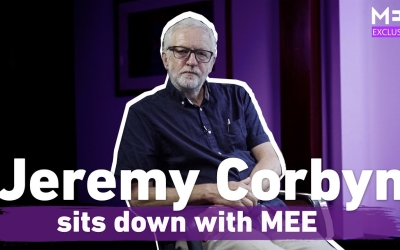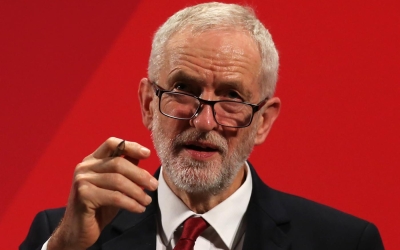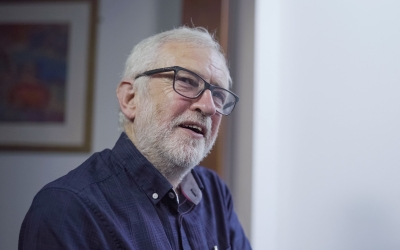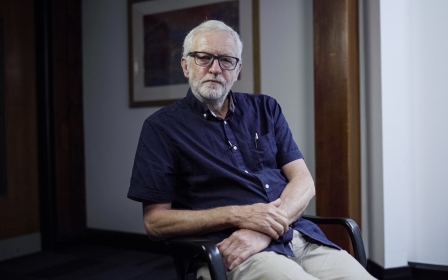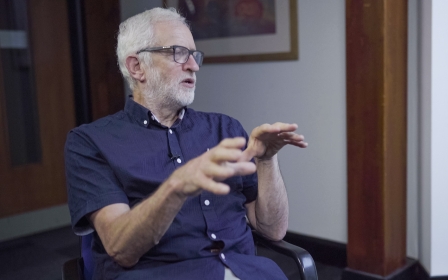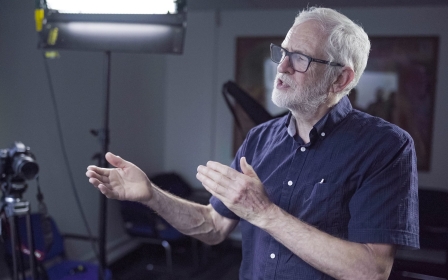Jeremy Corbyn: Brexit divisions 'too big' for Labour to deal with
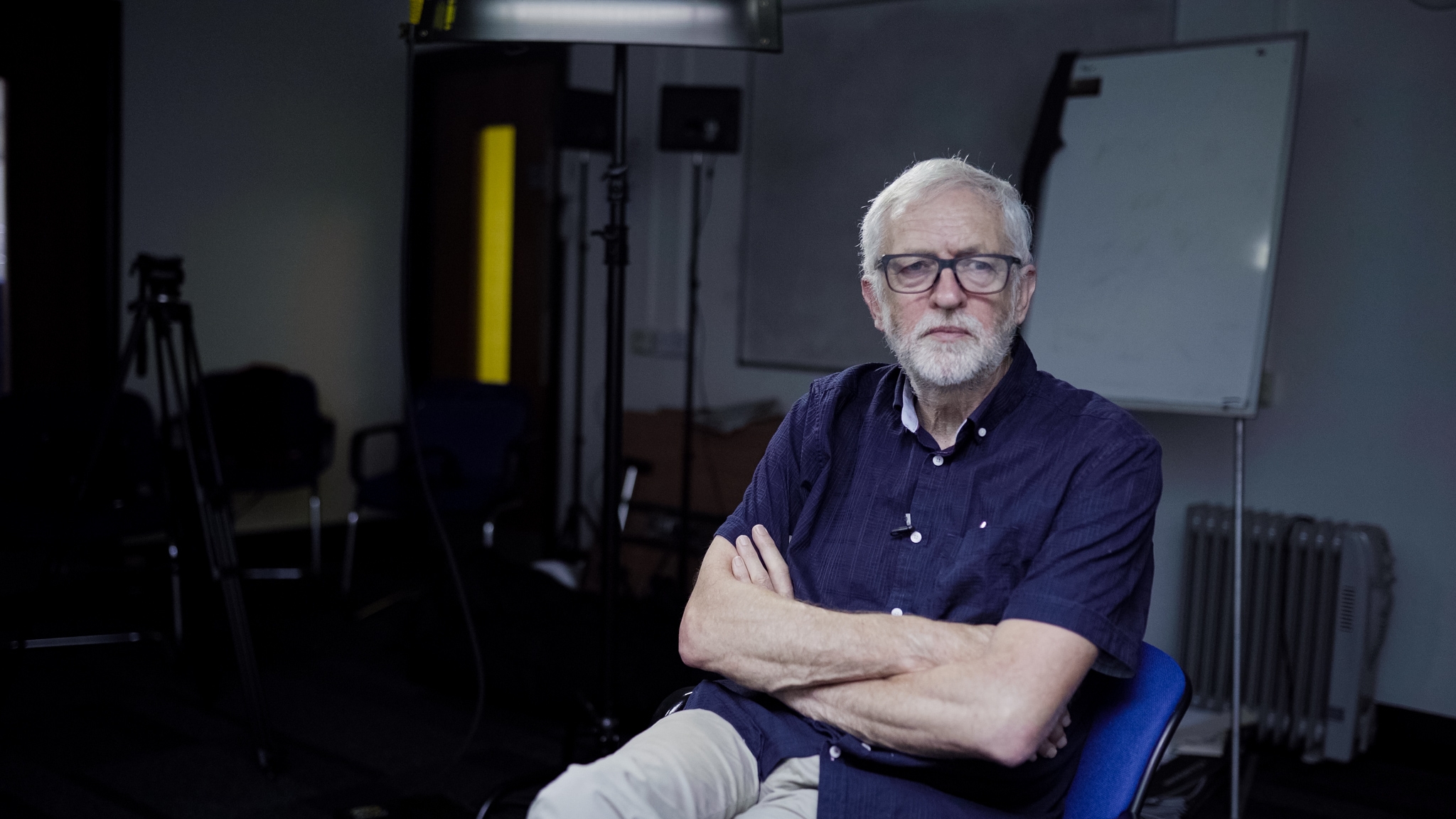
Jeremy Corbyn has defended his record on Brexit, describing the issue which dominated and divided British politics for much of his time as Labour leader as a “bridge too big” for the party to cross.
In an interview with Middle East Eye, Corbyn conceded that efforts to strike a compromise between pro-leave and pro-remain Labour supporters had cost the party votes in last December's general election.
'Brexit was a bridge that was too big for the Labour Party to traverse'
- Jeremy Corbyn
But he said: “In a sense, Brexit was a bridge that was too big for the Labour Party to traverse.”
Labour's policy in the election involved offering a second referendum on a negotiated exit deal in which Corbyn said he would remain neutral. But the policy and Corbyn's apparent ambivalence, during a campaign in which Boris Johnson campaigned on a slogan to “Get Brexit Done”, was blamed by some for a collapse in support for Labour among voters who favoured leaving the EU.
Labour lost 60 seats in the election, including more than 50 in its traditional post-industrial heartlands in northern England where large numbers supported Brexit, slumping to its worst election result since 1935.
New MEE newsletter: Jerusalem Dispatch
Sign up to get the latest insights and analysis on Israel-Palestine, alongside Turkey Unpacked and other MEE newsletters
Corbyn admitted that the party's policy had been “a compromise that clearly didn't find favour with Labour voters in those areas”.
But he said he believed the party could have fared even more badly if it had lost the support of the majority of members who favoured remaining in the EU.
“I was faced with a problem after the referendum that the vast majority of Labour members were for remain. The majority supported a concept of a second referendum... but a substantial minority, probably 35-40 percent, something like that, were for leave,” he said.
“And the Labour Party conference of last year had this very difficult chasm it had to cross.”
Corbyn said that the policy of holding a referendum offering a choice between a negotiated exit from the EU and remaining in the bloc was agreed with backing from both pro-leave and pro-remain unions.
'We would have lost London'
“It was a compromise that, clearly, didn't find favour with Labour voters in those areas. But, had we gone in any other direction, I'm quite clear we would have lost support in London and the south-east.”
Labour defended 49 seats in London, losing one seat and gaining one, as well as holding onto eight seats in Conservative-dominated south-east England.
In January, a leaked Labour report into the election defeat concluded that there was "no easy way for Labour to address the Brexit issue" and noted that Corbyn had been the victim of four years of attacks on his character which were an "assault without precedent in modern politics”.
But polling by YouGov after the election found that 35 percent of former Labour voters said they had not voted for the party because of Corbyn's leadership, while only 19 percent blamed the party's Brexit policy.
Corbyn also rejected criticism that he had not campaigned hard enough for remain during the 2016 referendum on EU membership in which a narrow majority voted to leave the EU.
“I did more visits, more miles, more meetings, more rallies than the rest of the shadow cabinet put together,” he said.
“I spoke at rallies on Perranporth beach in Cornwall, and I spoke to fishermen in Aberdeen. I travelled the length and breadth of the country on it.”
Corbyn expressed strong criticism of the EU however, describing Labour's policy as "remain and reform".
"The EU has quite good basic environmental standards, it has quite good intentions on workers’ rights. They're not as strong as they ought to be, but it also has a penchant for neoliberal economics," he said.
'Interventionist economics'
Referring to Greece, which was required to adopt harsh austerity measures in return for EU bailout money in the aftermath of the 2008 economic crisis, he added: "Look at the lectures that they've given to southern European countries during the financial crisis.
"My view was that if we remained in the European Union, ours would be a voice for interventionist economics; would be for full employment; would be for minimum welfare standards and a European-wide minimum employment standard.
"Because at the moment there are very low wages paid in Eastern Europe and that means that people leave Eastern Europe to work somewhere else and send the money home. And the issues of inequality and the treatment of those migrant workers when they come to western Europe is disgraceful. So, mine would have been a voice that would have been very, very different."'
Corbyn suggested that coverage of his campaign had been overshadowed by the argument over Brexit within the governing Conservative Party: “The only show in town was the blue on blue war. So, the stories day in, day out were between [then-prime minister David] Cameron and Boris Johnson, basically, who were obviously on opposite sides.”
He said that claims he was inactive during Brexit were “a bit unfair” because “nobody said that during the campaign. They only sort of concocted the story afterwards.”
Corbyn also revealed that Labour negotiators had made “quite a lot of progress” on worker rights in weeks of talks with former prime minister Theresa May aimed at securing the party's support for her proposed Brexit deal.
“We did go into negotiations with her. We were serious about it and we went on for six weeks. We had teams of people involved dealing with the environmental aspects, dealing with the workers’ rights aspects and dealing with future trade arrangements.
“We made quite a lot of progress on the workers’ rights side of things. Rebecca Long-Bailey [Labour's then-shadow secretary for business, energy and industrial strategy] led on that part. We didn't make as much progress as I wanted on environmental standards and protection of those, and it seemed to me that that was the area that we could not reach agreement on.
“Eventually, the shadow cabinet concluded the talks had reached their natural conclusion.”
May's deal was rejected by both leavers and remainers in parliament, paving the way for her resignation and replacement in Downing Street by Johnson on the back of his pledge to take the UK out of the EU, even at the risk of doing so without a negotiated exit deal.
Asked why he had not backed May's softer exit, Corbyn said: “I'm not sure that deal would have stuck anyway if we had done a deal. The Parliamentary Labour Party was divided on the subject.”
He pointed out that a number of Labour MPs representing strong leave areas had subsequently defied the party whips “thinking it would save their seats” to support Johnson's withdrawal bill in October 2019.
Decades of neglect
Corbyn linked support for Brexit in traditionally Labour-voting areas to a failure to address problems caused by decades of deindustrialisation, a lack of investment, and a dependency on “cheap Chinese imports”, which he said constituted a “fundamental economic weakness in Britain”.
He said: “The problem was that many parts of this country have seen no investment for a very long time. They've seen deindustrialisation that started in the 1980s, have never seen the replacement of cherished and now lost industries with good quality jobs.
“You have communities where there's very low levels of union membership, there's very high levels of insecure work and very high levels of institutional poverty within those areas.”
Middle East Eye delivers independent and unrivalled coverage and analysis of the Middle East, North Africa and beyond. To learn more about republishing this content and the associated fees, please fill out this form. More about MEE can be found here.


